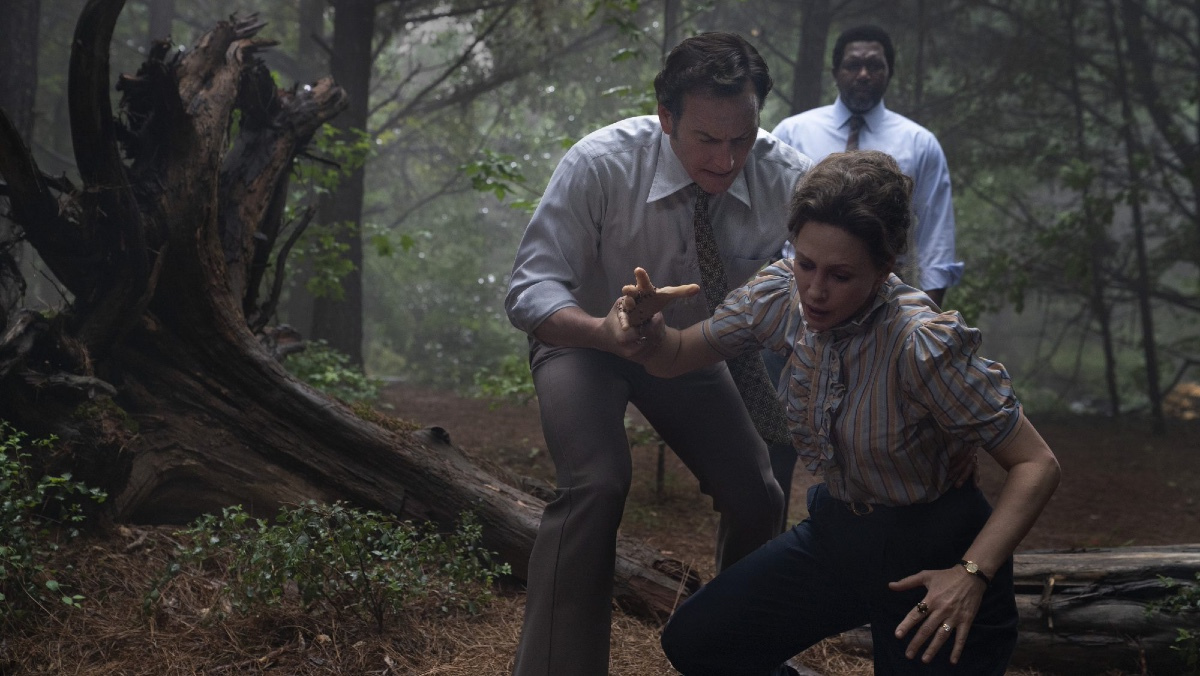What to Watch Verdict
'The Conjuring: The Devil Made Me Do It' was never going to live up to Wan's first two entries, but sustains the base-level spookiness audiences will appreciate.
Pros
- +
🐕 Yeah, you'll jump a lot.
- +
🐕 Patrick Wilson and Vera Farmiga, duh.
- +
🐕 That opening exorcism.
- +
🐕 Nostalgia, yay!
Cons
- -
🐕 Fails the comparison test to both previous entries.
- -
🐕 Scares lack consistency.
- -
🐕 Better at replicating the past than creating anew.
Minutes before showtime, I optimistically clenched a sole dominating hope for The Conjuring: The Devil Made Me Do It—redemption for Michael Chaves. The Conjurverse veteran’s feature debut, The Curse Of La Llorona, is a James Wan imitator that fumbles cultural resonance while living in the shadow of Wan’s vastly more accomplished, paralytically scare-forward signatures. The fact remains, I still don’t know who “Michael Chaves: The Filmmaker” is beyond measured genre templates and half-realized Wanisms without the Aussie’s impenetrable oomph. What (presumably) closes Ed and Lorraine Warren’s tentpole trilogy is a diversion into procedural courtroom opposition by detailing the first American defense claim of “Demonic Possession,” and retains lifesaving performances from Hollywood’s Ed and Lorraine Warren. It’s just how Chaves approaches terror visions and atmosphere lacks the natural nightmarishness we’re accustomed to, feeling vastly more formulaic—nothing I’ve ever written about Wan to this point.
In this chapter of Ed (Patrick Wilson) and Lorraine’s (Vera Farmiga) popularized history, they investigate the trial of Arne Cheyenne Johnson (Ruairi O'Connor). Their cause? During the exorcism of David Glatzel (Julian Hilliard), Arne sacrifices himself as host so David can be freed—Ed beholds the martyrdom but is hospitalized before declaring the information. Months pass, and despite Ed regaining consciousness to warn of Arne’s possession, Arne commits his famed 1981 murder in front of girlfriend Debbie Glatzel (Sarah Catherine Hook). Ed and Lorraine choose to prove Arne’s murderous deed resulted from demonic possession, prompting a variation on “the devil made me do it” to be uttered by Arne’s lawyer.
Cue the Law And Order theme, Paranormal Victims Boo-nit!
That’s not to say the Warrens have never encountered disbelieving cops before, but The Conjuring: The Devil Made Me Do It introduces a collaborative aspect that influences tonality. As we learn, occultists may be planting animal skeleton totems as part of a satanic curse—enter connecting cases—as the Warrens, including a medically hindered and panting Ed Warren with heart pills, seek due justice for Arne. Chaves balances a war waged against spiritual entities who thrive off harm with lawmen who treat Lorraine’s gift as a sideshow, bridging that gap between doubt and the unexplained we’ve often seen in The Conjuring films to the grandest extent. It's an accomplished mission that thankfully stays out of stuffy interrogation rooms, yet rarely stands alongside The Conjuring or The Conjuring 2—better listed next to the adjunct spinoffs with farther-flung identities.
Don’t get me wrong, David Leslie Johnson-McGoldrick’s screenplay is indebted to the Warrens' cinematic narrative thus far—Patrick Wilson and Vera Farmiga further cement their pillars of 2010s horror do-gooding. Julian Hilliard’s opening exorcism contorts and clatters evil winds (demon winds?) with a fury that looks stupendous on the big screen and epitomizes the idea of blockbuster horror with a proud level of relentlessness. The Conjuring: The Devil Made Me Do It (unsurprisingly) excels when Wilson and Farmiga are spectrally antagonized beyond their previous brinks, in particular to Lorraine’s abilities—be it violent crime scene flashbacks or Ed’s more alert hesitations (the wounded husband taking a step back). It’s the little things like Lorraine asking Ed, who leans on a steel-tipped cane, to “hold my purse” while she shuffles hands and knees through a cobwebbed crawlspace. His reticence in her going alone worn with a scowl; her smirk and reassurance so bright. These are the beats that endure.
Where Chaves takes a step backward is, unfortunately, when horror should embolden. The Conjuring: The Devil Made Me Do It is never as immersively chilling as either previous entry because Chaves relies so heavy-handedly on misdirections. Wan’s manipulation of shadows and what needn’t hide is foregone by Chave’s necessity to stare into darkness; we know a monster will lunge from within, as one of the film’s repetitious tricks. Where Wan elevates garden-variety haunted scares, Chaves leans in—plenty suitable for Friday night crowds, but it’s missing that next-level embellishment customary in Wan’s traditions. Not to mention how in The Conjuring and The Conjuring 2, every highlight is something Wan creates anew (the claps, the Crooked Man, etc.)—Chaves’ most prolific shots are all callbacks that trail our minds elsewhere (e.g., The Exorcist shot-for-shot). It’s a note I can’t shake.
That’s not to say The Conjuring: The Devil Made Me Do It lacks bluster or polish—Chaves understands what theatergoers desire and executes a collaborative vision. Composer Joseph Bishara fiddles with a score that adapts whether going near-silent to accentuate the plodding footsteps of a reanimated corpse or booming crescendos when characters encounter their witchcraft villains. Cinematographer Michael Burgess nails the mirror imagery of a good pastor’s taxi arrival for "insider" giggles while also inciting doomy, gloomy sensations from settings like damp underground tunnels or chilly Massachusetts woodlands in the dead of night. Chaves commands a Conjurverse movie that structurally fits in canon, down to formidable performances that include Ruairi O'Connor’s self-inflicting defense against unholy fates or John Noble’s retired man of faith who’s seen too much. The pieces are all there, but then narration starts blurring the lines between “human” and “inhuman,” mixed with a deflating exquisiteness that once helped position James Wan as one of, if not the premiere voice of modern horror cinema.
The latest updates, reviews and unmissable series to watch and more!
Of course, to critique is to remain focused on the product at hand. The Conjuring: The Devil Made Me Do It pulsates with spookiness that successfully ruins water beds, cereal boxes, and kennels for at least the night. Patrick Wilson and Vera Farmiga sustain the Warrens’ legacy through another portrayal of supernatural encounters that exude warmth, reason, and vindication with such effortless breaths (even if I say Insidious 2 does something better). I just sit here, a day after peering into what the devil indeed made someone do, without the ability to remember standout accomplishments. Meanwhile, The Conjuring and The Conjuring 2 live in my head "rent free" as the kids say. No doubt, an underwhelming if not a satisfactory solution to stream with other Conjurverse devotees—more a product of franchise filmmaking than a ceremoniously summoned vision of headliner terror.
The Conjuring: The Devil Made Me Do It will hit theaters and HBO Max simultaneously on June 4th, 2021.
Matt Donato is a Rotten Tomatoes approved film critic who stays up too late typing words for What To Watch, IGN, Paste, Bloody Disgusting, Fangoria and countless other publications. He is a member of Critics Choice and co-hosts a weekly livestream with Perri Nemiroff called the Merri Hour. You probably shouldn't feed him after midnight, just to be safe.


